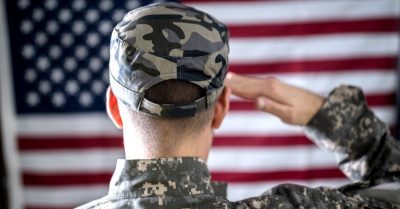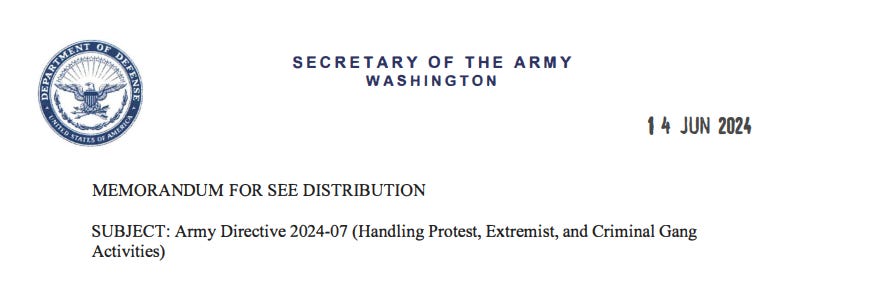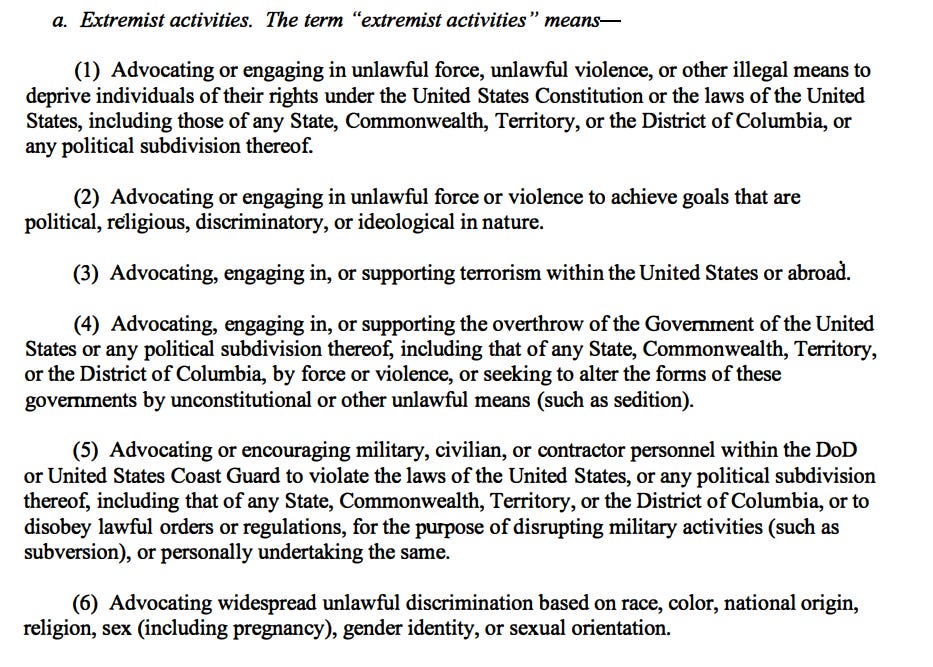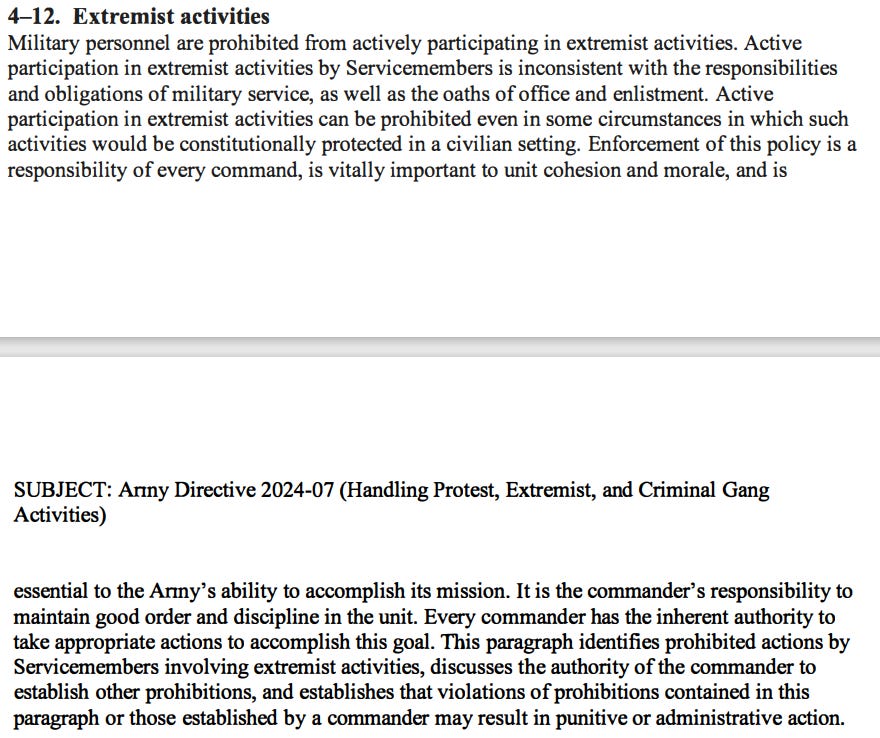Army Moves to Ban “Extremism”, Repeal the Truth
Extremism as a catch-all phrase for ideas and interpretations that are threatening

All Global Research articles can be read in 51 languages by activating the Translate Website button below the author’s name (only available in desktop version).
To receive Global Research’s Daily Newsletter (selected articles), click here.
Click the share button above to email/forward this article to your friends and colleagues. Follow us on Instagram and Twitter and subscribe to our Telegram Channel. Feel free to repost and share widely Global Research articles.
Spread the Truth, Refer a Friend to Global Research
***
The issue by the Army of a directive entitled “Handling Protest, Extremism, and Criminal Gang Activities” on June 14, 2024, essentially forbids the discussion of any issues that the military designates as “extremist” by any member of the army, even when off duty.

The directive applies to the reserve and national guard, and most likely will be expanded to cover all armed services, and then the entire federal government.
Two detailed memorandums were sent out by Army Secretary Christine Wormuth.
All such activities, including bumper stickers on cars and posts on social media when off duty, that are deemed to be “extremist” must be reported to commanders who are, in turn, required to report to the US ARMY Criminal Investigation Division. What is and what is not “extremist” is left to the commander to determine.
If the main concern was criminal gangs and racist ideology, it would be one thing, but a careful reading of the directive shows that this blanket prohibition can be, and will be, applied to COVID-19 truth, 9/11 truth, discussions of the illegal or criminal actions of officers and politicians, corruption within the army, and all discussion concerning whether directives and orders are legal, or constitutional, or even consistent with US Army policy.


Army Directive 2024-07 “Handling Protest, Extremism, and Criminal Gang Activities”
June 14, 2024
4-12. Extremist activities Military personnel are prohibited from actively participating in extremist activities. Active participation in extremist activities by Servicemembers is inconsistent with the responsibilities and obligations of military service, as well as the oaths of office and enlistment. Active participation in extremist activities can be prohibited even in some circumstances in which such activities would be constitutionally protected in a civilian setting. Enforcement of this policy is a responsibility of every command, is vitally important to unit cohesion and morale, and is SUBJECT: Anny Directive 2024-07 (Handling Protest, Extremist, and Criminal Gang Activities) essential to the Anny’s ability to accomplish its mission. It is the commander’s responsibility to maintain good order and discipline in the unit. Every commander has the inherent authority to take appropriate actions to accomplish this goal. This paragraph identifies prohibited actions by Servicemembers involving extremist activities, discusses the authority of the commander to establish other prohibitions, and establishes that violations of prohibitions contained in this paragraph or those established by a commander may result in punitive or administrative action.
a. Extremist activities. The term “extremist activities” means
(1) Advocating or engaging in unlawful force, unlawful violence, or other illegal means to
deprive individuals of their rights under the United States Constitution or the laws of the United States, including those of any State, Commonwealth, Territory, or the District of Columbia, or any political subdivision thereof.
(2) Advocating or engaging in unlawful force or violence to achieve goals that are political, religious, discriminatory, or ideological in nature.
(3) Advocating, engaging in, or supporting terrorism within the United States or abroad.
(4) Advocating, engaging in, or supporting the overthrow of the Government of the United States or any political subdivision thereof, including that of any State, Commonwealth, Territory, or the District of Columbia, by force or violence, or seeking to alter the forms of these governments by unconstitutional or other unlawful means (such as sedition).
(5) Advocating or encouraging military, civilian, or contractor personnel within the DoD or United States Coast Guard to violate the laws of the United States, or any political subdivision thereof, including that of any State, Commonwealth, Territory, or the District of Columbia, or to disobey lawful orders or regulations, for the purpose of disrupting military activities (such as subversion), or personally undertaking the same.
(6) Advocating widespread unlawful discrimination based on race, color, national origin, religion, sex (including pregnancy), gender identity, or sexual orientation.
b. Active participation. The term “active participation” means the following, except where such activity is within the scope of an official duty (for example, intelligence or law enforcement operations)-
(1) Advocating or engaging in the use or threat of unlawful force or violence in support of extremist activities.
2 SUBJECT: Army Directive 2024-07 (Handling Protest, Extremist, and Criminal Gang Activities)
(2) Advocating for, or providing material support or resources to, individuals or organizations that promote or threaten the unlawful use of force or violence in support of extremist activities, with the intent to support such promotion or threats.
(3) Knowingly communicating information that compromises the operational security of any military organization or mission, in support of extremist activities.
(4) Recruiting or training others to engage in extremist activities.
(5) Fundraising for or making personal contributions through donations of any kind (including but not limited to the solicitation, collection, or payment of fees or dues) to, a group or organization that engages in extremist activities, with the intent to support those activities.
(6) Creating, organizing, or taking a leadership role in a group or organization that engages in or advocates for extremist activities, with knowledge of those activities.
(7) Actively demonstrating or rallying in support of extremist activities (but not merely observing such demonstrations or rallies as a spectator).
(8) Attending a meeting or activity with the knowledge that the meeting or activity involves extremist activities, with the intent to support those activities:
(a) When the nature of the meeting or activity constitutes a breach of law and order.
(b) When a reasonable person would determine the meeting or activity is likely to result in violence; or
(c) In violation of off-limits sanctions or other lawful orders.
(9) Distributing literature or other promotional materials, on or off a military installation, the primary purpose and content of which is to advocate for extremist activities, with the intent to promote that advocacy.
(10) Knowingly receiving material support or resources from a person or organization that advocates or actively participates in extremist activities with the intent to use the material support or resources in support of extremist activities.
(11) When using a government communications system and with the intent to support extremist activities, knowingly accessing internet websites or other materials that promote or advocate extremist activities.
3 SUBJECT: Army Directive 2024-07 (Handling Protest, Extremist, and Criminal Gang Activities)
(12) Knowingly displaying paraphernalia, words, or symbols in support of extremist activities or in support of groups or organizations that support extremist activities, such as flags, clothing, tattoos, and bumper stickers, whether on or off a military installation.
(13) Engaging in electronic and cyber activities regarding extremist activities, or groups that support extremist activities-including posting, liking, sharing, re-tweeting, or otherwise distributing content-when such action is taken with the intent to promote or otherwise endorse extremist activities. Military personnel are responsible for the content they publish on all personal and public internet domains, including social media platforms, blogs, websites, and applications.
(14) Knowingly taking any other action in support of or engaging in extremist activities, when such conduct is prejudicial to good order and discipline or is service discrediting.
c. Command authority. Commanders have the authority and responsibility to prohibit Servicemembers from actively participating in extremist activities and any other activities that the commander determines will adversely affect readiness, good order and discipline, or morale within the command. This includes, but is not limited to, the authority to order the removal of symbols, flags, posters, or other displays from military-controlled areas; to place areas or activities off-limits (see AR 190 -24); or to order Servicemembers not to participate in those activities that are contrary to good order and discipline or morale of the unit, or pose a threat to health, safety, and security of military personnel or a military installation.
d. Command options. The policy rules and prohibitions regarding participation in extremist activities apply to members of the Army Reserve and the ARNG regardless of whether the prohibited activity occurs while on or off orders under Title 10 or 32 of the USC. As appropriate, commanders may pursue adverse administrative in addition to or in lieu of punitive action in response to a Servicemember’s active participation in extremist activities. A commander’s options for dealing with a Servicemember’ s violation of the prohibitions include, but are not limited to:
(1) UCMJ action, subject to jurisdictional limitations requirements set forth in the Manual for Courts-Martial.
(2) Adverse administrative action which may include, but is not limited to:
(a) Involuntary separation.
(b) Reassignment.
(c) Loss of security clearance.
4 SUBJECT: Army Directive 2024-07 (Handling Protest, Extremist, and Criminal Gang Activities)
(d) Bar to continued service.
(e) Other administrative or disciplinary action deemed appropriate by the commander, based on the specific facts and circumstances of the particular case.
e. Command responsibility. Military personnel actively participating in extremist activities could threaten the good order and discipline of a unit. As such, and in an effort to minimize the risk of future active participation in extremist activities, commanders should remain alert and should intervene early, primarily through counseling, when observing signs of future extremist activities that may not rise to the level of the prohibitions in paragraphs 3-12a and 3-12b.
The goal of early intervention is to minimize the risk of future extremist activities. In these situations, commanders will take positive actions to educate Soldiers, putting them on notice of the potential adverse effects that participation in violation of Army policy may have upon good order and discipline in the unit and upon their military service.
*
Note to readers: Please click the share button above. Follow us on Instagram and Twitter and subscribe to our Telegram Channel. Feel free to repost and share widely Global Research articles.
This article was originally published on Fear No Evil.
Emanuel Pastreich served as the president of the Asia Institute, a think tank with offices in Washington DC, Seoul, Tokyo and Hanoi. Pastreich also serves as director general of the Institute for Future Urban Environments.
Pastreich declared his candidacy for president of the United States as an independent in February, 2020.
He is a regular contributor to Global Research.

